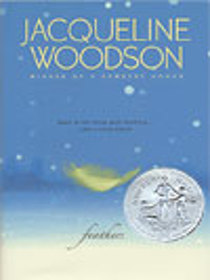Presents an honest view from a young adolescent and her coming-of-age. Familial relationships are strong,loving and support the main character's exploration through peer relationships.
Search -
Feathers
Feathers
Author:
Frannie's world is separated by the highway. Her side is where the black families live, and her school is made up entirely of black children. That is, until a new kid arrives. With his long hair, pale skin and rather prophetic way of speaking, the boy soon gets the nickname "Jesus Boy," or simply "Jesus." Some children reject Jesus outright, tel... more »
Author:
Frannie's world is separated by the highway. Her side is where the black families live, and her school is made up entirely of black children. That is, until a new kid arrives. With his long hair, pale skin and rather prophetic way of speaking, the boy soon gets the nickname "Jesus Boy," or simply "Jesus." Some children reject Jesus outright, tel... more »
ISBN: 239435
Rating: ?
Rating: ?
0 stars, based on 0 rating
Publisher: /
Book Type: Hardcover
Other Versions: Paperback, Audio Cassette, Audio CD
Members Wishing: 0
Reviews: Member | Write a Review
Book Type: Hardcover
Other Versions: Paperback, Audio Cassette, Audio CD
Members Wishing: 0
Reviews: Member | Write a Review
Please Log in to Rate these Book Reviews
Genres:




